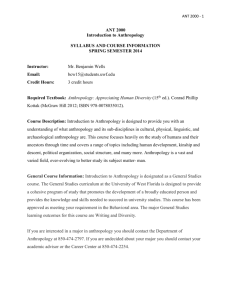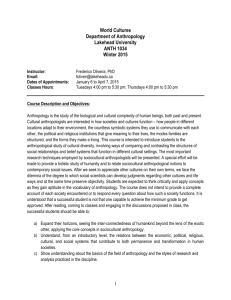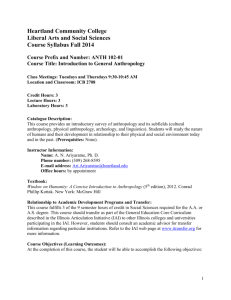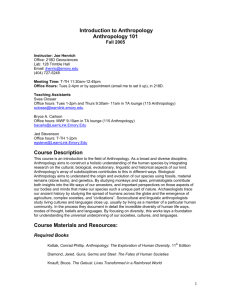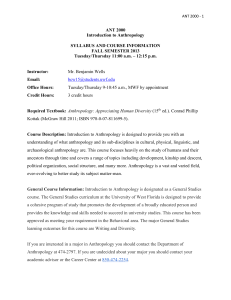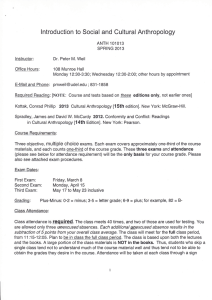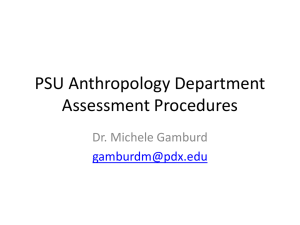ANT 2000 - ANT 2000 Introduction to Anthropology SYLLABUS AND
advertisement
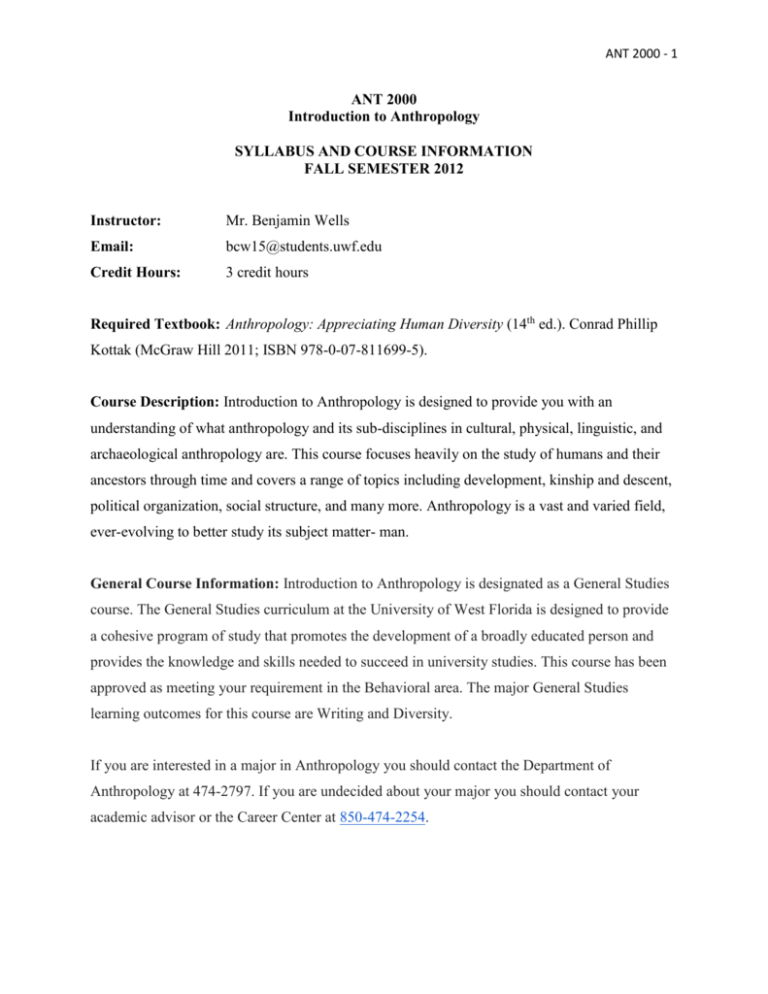
ANT 2000 - 1 ANT 2000 Introduction to Anthropology SYLLABUS AND COURSE INFORMATION FALL SEMESTER 2012 Instructor: Mr. Benjamin Wells Email: bcw15@students.uwf.edu Credit Hours: 3 credit hours Required Textbook: Anthropology: Appreciating Human Diversity (14th ed.). Conrad Phillip Kottak (McGraw Hill 2011; ISBN 978-0-07-811699-5). Course Description: Introduction to Anthropology is designed to provide you with an understanding of what anthropology and its sub-disciplines in cultural, physical, linguistic, and archaeological anthropology are. This course focuses heavily on the study of humans and their ancestors through time and covers a range of topics including development, kinship and descent, political organization, social structure, and many more. Anthropology is a vast and varied field, ever-evolving to better study its subject matter- man. General Course Information: Introduction to Anthropology is designated as a General Studies course. The General Studies curriculum at the University of West Florida is designed to provide a cohesive program of study that promotes the development of a broadly educated person and provides the knowledge and skills needed to succeed in university studies. This course has been approved as meeting your requirement in the Behavioral area. The major General Studies learning outcomes for this course are Writing and Diversity. If you are interested in a major in Anthropology you should contact the Department of Anthropology at 474-2797. If you are undecided about your major you should contact your academic advisor or the Career Center at 850-474-2254. ANT 2000 - 2 Course Objectives: By the end of the course I hope you will be able to: Demonstrate a clear understanding of the different sub-fields of anthropology and how all work together to some degree. Illustrate the breadth of what culture is and the variety of ways it can be studied and observed, not only scientifically, but in an everyday setting. Demonstrate an understanding of anthropological perspectives on cultural issues from the past and present, and some of the solutions anthropology can offer on current global problems. Be able to identify how anthropology works in the world today and the range of possibilities and benefits it offers to students of any field of study. Specific Course Requirements: Textbook assignments: Weekly reading will be assigned from the textbook. This information will be necessary to complete quizzes, tests, assignments, and to actively participate in weekly discussions. Discussions: Each week you will be required create a topic of discussion and respond to another classmate’s topic. Topics such as “This week’s reading was interesting” or “Culture is cool” will be considered unacceptable and not count toward your grade. Likewise, responses such as “I agree/disagree” or “That’s a good point” will also not count. I am looking for fully developed and defended thoughts and opinions. This does not mean I expect page long essays. Please feel free to respond more than the required amount, it may benefit you in the end! Live Chat: Each week I will be available for live chat for anyone that would like to communicate that way. I will inform you on Mondays what day and time I will be available. Keep in mind I am constantly monitoring the course online and may be available throughout the week at other random times, though email will always be the best way to contact me. Quizzes: I will periodically assign quizzes in order to gauge your understanding of the reading for the week. Tests: Due to the nature of the material, four equally weighted tests will be given during the course of the class. Each of these will be worth 100 points. Exams will ANT 2000 - 3 draw from readings and discussions. Key concepts will be addressed in a variety of formats including matching, multiple choice, short answer, and essay. Due Dates and Assignments: All discussions, assignments, quizzes, and tests are time sensitive. They will open at 12:00 a.m. Tuesday mornings and close at 11:59 p.m. Monday nights. This gives you an entire week to complete all the required assignments. It is your responsibility to ensure all material is turned in before the deadline. Late work will not be accepted. Extra credit: There will be no extra credit work for this course. Grading system: Letter grade to percentage equivalents (see Evaluation and Grades document on eLearning for grades per assignment breakdown). A 100-93% A- 92-90% B+ 89-87% B 86-83% B- 82-80% C+ 79-77% C 76-73% C- 72-70% D+ 69-66% D 65-60% F 59-0% Technology Use: This course is entirely online. All instructional content and interaction occurs over the internet, namely through eLearning. As this course is completely online, you must have continual access to the internet. All quizzes, tests, discussions, and assignment are fulfilled online. University policy on academic conduct/plagiarism: As members of any academic setting, such as the University of West Florida, we commit to honesty and integrity. The Student Code of Conduct sets forth the rules, regulations, and expected behavior of students enrolled here at UWF. It is your responsibility to read the Student Code of Conduct and act accordingly in all situations. You may access the current Student Code of Conduct at http://uwf.edu/osrr/documents/BOTApprovedStudentCodeofConduct-2010edition.pdf. This is the most up-to-date version. As far as plagiarism is concerned, UWF defines it as “The act of representing the ideas, words, creations, or work of another as one’s own.” The penalty for being caught plagiarizing is failure for the assignment, and perhaps the whole course. It is up to the instructor whether that student should be recommended for suspension from the university as ANT 2000 - 4 well. Please see the UWF Student Handbook for further information. Additionally, the full statement of the university’s academic integrity policy and misconduct procedures can be found here http://uwf.edu/academic/policies/misconduct/misconduct.cfm. Statement about assistance for students with special needs: The Student Disability Resource Center (SDRC) at the University of West Florida supports an inclusive learning environment for all students. If there are aspects of the instruction or design of this course that hinder your full participation, such as time-limited exams, inaccessible web content, or the use of non-captioned videos and podcasts, please notify the instructor or the SDRC as soon as possible. You may contact the SDRC office by e-mail at sdrc@uwf.edu or by phone at (850) 474-2387. Appropriate academic accommodations will be determined based on the documented needs of the individual. Course Schedule1 Week 1 (August 28): Chapter 1 of Kottak – What is Anthropology? Week 2 (September 4): Chapter 2 & Online Articles – Everything is Culture?! Week 3 (September 11): Chapters 5 & 6 of Kottak –Evolution and human variation Week 4 (September 18): Chapters 15 of Kottak – Race, ethnicity, population Week 5 (September 25): Exam 1 Week 6 (October 2): Chapters 7& 8 of Kottak – Distant cousins, their relationship to us, early Homini Week 7 (October 9): Chapters 9 & 4 of Kottak – Our genus, how we study past cultures Week 8 (October 16): Chapters 10 & 11 of Kottak – Let’s Move and Settle! Week 9 (October 23): Exam 2 Week 10 (October 30): Chapters 16 & 17 of Kottak – Adaptive strategies, Political organization Week 11 (November 6): Chapters 18 & 19 of Kottak – Kinship, Descent, Gender Week 12 (November 13): Chapters 20 of Kottak – Marriage 1 I reserve the right to alter the schedule throughout the course of the semester. ANT 2000 - 5 Week 13 (November 20): Exam 3 Week 14 (November 27): Chapters 13, 22-24 of Kottak – Studying present cultures, cultures in flux Week 15 (December 4): Chapters 14 & 21 of Kottak – Belief systems and language Week 16 (December 14): Final Exam Due 5:00 p.m.
